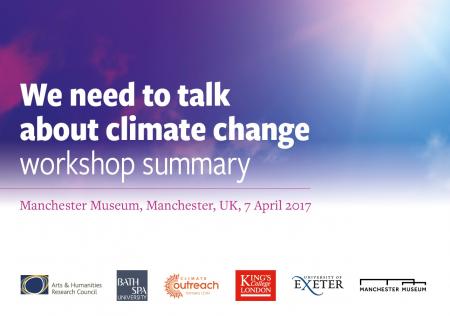ACTIONS
- Protect and safeguard cultural and natural heritage
- Learning and educational opportunities
- Cultural participation/social inclusion
- Sustainable tourism
- Support research
- Employment (recruiting, training, safety)
- Energy consumption, greenhouse gas emissions
- Waste management and reduction
- Transport (forms of, energy use)
- Commercial activities including copyright and IP
- Governance and management
- Security, disaster preparedness, risk reduction
- External partnerships and collaborations
- Toolkit/framework/roadmap
- Sign-post to other resource (database)
We need to talk about climate change

Intended Audience
Heritage sector, notably people involved in developing and delivering public-facing activities (events, exhibitions, educational programmes).
- Woodham, A., de Massol, C., Orchard-Webb, J., Penrhyn Jones, S., Onciul, B, McGhie, H. and G. Marshall, Troubled Waters Project
“This workshop facilitation pack outlines the premise, format and resources we drew upon for the ‘We need to talk about Climate Change’ workshop at the Manchester Museum, Manchester, UK, on 7 April 2017. The aim of this workshop was to come together to explore existing heritage sector practices; share new approaches to engagement and communication around climate change; and to help forge positive connections and modes of collaboration. For example, learning tools (like this facilitation guide) were requested by participants so they might initiate/animate conversations with their own audiences.”
Avaiable in
- English
SDGs LINKAGES
The resource can be used by collecting institutions for staff training and development (SDG 4.4) to support educational activities linked to climate change (SDGs 4.7, 12.8, 13.1, 13.3), contributing to disaster preparedness and Disaster Risk Reduction (SDGs 1.5, 13.1, 11.5).
Click on the SDG Target to discover Our Collections Matter indicators
-
Our Collections Matter indicators:
- Number of collecting programmes that aim to build resilience to climate-related events and other shocks and disasters, for example by forming collections that can contribute to related educational and research programmes.
- Number of educational programmes drawing on collections that incorporate resilience perspectives.
- Number of targeted programmes drawing on collections that are aimed at vulnerable groups, to build their resilience to climate-related and other shocks and disasters.
- Number of research programmes drawing on collections that are aimed at building resilience to climate-related and other shocks and disasters.
- Strengthen the resilience of employees, communities and suppliers by paying at a minimum the living wage and offering insurance to employees and their families, such as accident insurance; and by paying fair prices to all suppliers.
-
Our Collections Matter indicators:
- Number of young people and adults in skills-development activities and programmes drawing on collections, for employment, decent jobs and entrepreneurship.
- Increase in number of young people and adults in such programmes.
- Number and proportion of staff who have received training in the last year, to better support their contribution to the SDGs.
- Programs and processes in place to ensure the availability of a skilled workforce.
-
Our Collections Matter indicators:
- Numbers of people in each type of programme drawing on collections from different demographic groups.
- Increases in numbers of people in each type of programme from different demographic groups.
- Proportion of people involved in such programmes in relation to overall audience size.
- Evidence that learners have acquired knowledge and skills to promote sustainable development.
-
Our Collections Matter indicators:
- Collections-based research that supports the understanding and management of disasters of all kinds.
- Plans in place for public education and awareness drawing on collections and collections-based institutions to reduce exposure and vulnerability to disasters of all kinds.
- Plans in place to ensure collections-based institutions steadily work to reduce their contributions to disaster risk, for example by reducing pollution and waste of all kinds.
- Plans in place to ensure collections-based institutions, and people related to them (including workers) are protected from economic losses as a result of disasters.
- Plans in place to provide special support/protection to poor and vulnerable people and groups in and following disasters.
-
Our Collections Matter indicators:
- Extent to which (i) global citizenship education and (ii) education for sustainable development (including climate change education) are mainstreamed in (a) national education policies; (b) curricula; (c) teacher education; and (d) student assessment.
- Extent to which global citizenship education and education for sustainable development (including climate change education) are mainstreamed in formal, informal and non-formal education programmes and activities drawing on and related to collections.
-
Our Collections Matter indicators:
- Plans in place for near and longer term to withstand and actively adapt to climate-related hazards and natural disasters.
-
Our Collections Matter indicators:
- Plans in place to enhance positive contributions to addressing climate change through use of collections. Plans in place to ensure collections, collections institutions and broader society can adapt effectively to climate change.
- Plans in place for effective education and awareness raising on climate change mitigation, adaptation, impact reduction and early warning.
- Plans in place to reduce negative contributions of collections-related functions, e.g. measuring greenhouse emissions with plans and targets in place to reduce them.
-
Our Collections Matter indicators:
- Adopt and implement constitutional, statutory and/or policy guarantees for public access to information.
- Plans in place, and plans implemented to enhance public access to information relating to collections.
- Plans in place, and plans implemented to support fundamental freedoms, in line with human rights, national and international agreements and legislation.
- Plans and procedures in place for public access to information relating to the operation and management of collections-based institutions.
- Complaint mechanism in place for public to use where public access to information and fundamental freedoms not supported or fulfilled.
